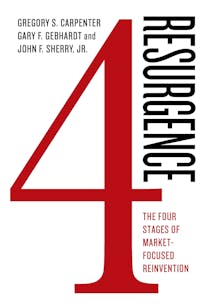Resurgence: The Four Stages of Market-Focused Reinvention
The Four Stages of Market-Focused Reinvention
 Download image
Download image
ISBN10: 1137278617
ISBN13: 9781137278616
Hardcover
256 Pages
$39.99
CA$54.50
Based on a multi-year study with several large companies, Resurgence reveals how some of the most interesting and notable brands in the world have managed to stage remarkably successful comebacks following periods of decline. The core of this book is a smart, simple four-part framework for reinvention, plus compelling advice distilled for general business readers. Yet,it also features fascinating, insider accounts of the change process, with stories from a core group of leaders at companies such as Motorola, Alberto Culver, Harley-Davidson, and others, as they considered the question: How do we reinvent a firm that does not recognize the need for radical change? Three top marketing experts bring a compelling wealth of experience and knowledge to the forefront as they were granted extensive access to the executives at these companies and track how each of these organizations look dramatically different as a result of its changed efforts.
Reviews
Praise for Resurgence: The Four Stages of Market-Focused Reinvention
"Being market focused is more important than ever. But few organizations know how to move effectively toward it, often finding themselves adrift. The authors describe seven major companies and what it took to achieve a market-focused reinvention, all captured in an illuminating four-stage process. Based on thorough research, Resurgence offers valuable insights into an increasingly important management challenge." —Philip Kotler, S. C. Johnson & Son Professor of International Marketing, Kellogg School of Management, Northwestern University
"Change is the only constant. Disruptions of business models that used to take decades now take a few years or even months. In response, companies must disrupt themselves before the competition does in order survive and thrive. The Four Stages of Market-Focused Reinvention provides a smart and simple framework for companies to navigate the need for constant change." —Jonathan D. Becher, Chief Marketing and Communications Officer, SAP
"A topical manifesto on turning around troubled businesses. With lively case studies on companies like Alberto-Culver, Harley Davidson, and Motorola, authors Carpenter, Gebhardt and Sherry speak to the urgency of reinventing a company not just by following the right steps but by following them in the right order. A highly readable blend of scholarly ethnography and how-to prescriptions." —Rohit Deshpande, Sebastian S. Kresge Professor of Marketing, Harvard Business School
"A gem of a book. It's a thought provoking managerial book that is rigorous as well as pragmatic. Steeped in several years of field research this book distils unique insights and a pragmatic step by step approach for businesses that are in need to reinvent themselves. Easily accessible, a joy to read and practically useful." —Marcel Corstjens, Unilever Chaired Professor of Marketing, INSEAD
"Resurgence is a unique combination of academic rigor and practical advice. The case studies and Reinvention Model clearly communicate the importance of leaders building a collaborative, results-oriented culture to seize marketplace opportunity." —Mary Dillon, CEO, Ulta Beauty
"For many businesses, it may seem like the world is moving faster than ever. Markets shift, competitors emerge and customer expectations rise, seemingly overnight. Yet organizations often fail to respond with speed, ending up adrift and in need of massive change just to survive. If success and history are the enemies of innovation, the practical actions mapped out in Resurgence offer a relevant and timely approach to confront the conditions that lead to stagnation. This book offers a refreshingly clear-eyed view of the challenges of sustaining change – and offers a straight-forward approach to reinvention that is relevant whether your organization is striving to reignite growth or just trying to stay ahead of the change happening all around you."—Lou Sanchez, Vice President, Leadership & Organization Development, eBay Inc.
"Resurgence provides a formula for successfully transforming your organization into a customer-driven organization. Employing a unique, ethnographic research approach, the authors discover that the secret sauce is in the sequence of initiatives and confirm that organizational health and culture play a critical role."—Betsy D Holden, Former Co-CEO, Kraft Foods


